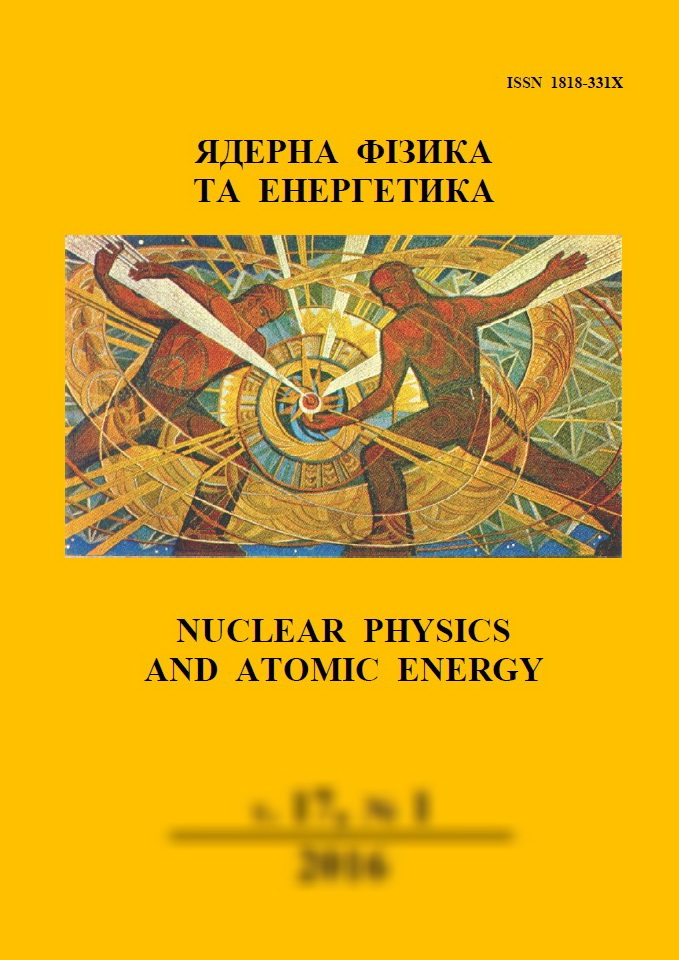 |
Ядерна фізика та енергетика
Nuclear Physics and Atomic Energy
ISSN:
1818-331X (Print), 2074-0565 (Online)
Publisher:
Institute for Nuclear Research of the National Academy of Sciences of Ukraine
Languages:
Ukrainian, English, Russian
Periodicity:
4 times per year
Open access peer reviewed journal
|
Nucl. Phys. At. Energy 2018, volume 19, issue 4, pages 366-375.
Section: Atomic energy.
Received: 10.08.2018; Accepted: 11.10.2018; Published online: 14.02.2019.
 Full text (ua)
Full text (ua)
https://doi.org/10.15407/jnpae2018.04.366
Monte-Carlo Serpent code validation based on the experimental data from research subcritical facility
O. P. Trofymenko1,2,*, A. V. Nosovsky1, V. I. Gulik1
1 Institute for Safety Problems of NPP, National Academy of Sciences of Ukraine, Kyiv, Ukraine
2 National Technical University of Ukraine “Igor Sikorsky Kyiv Polytechnic Institute”, Kyiv, Ukraine
*Corresponding author. E-mail address:
trofymenko.kotlov@gmail.com
Abstract:
Description of computation model for Kyoto University Critical Assembly (KUCA) developed with the help of Monte-Carlo Serpent code was presented in this paper. The simulation of criticality and subcriticality conditions for KUCA was carried out. The effective multiplication factors for different critical experiments were calculated for KUCA. The presented obtained results were considered and compared with the experimental data and with computation results from other Monte Carlo codes.
Keywords:
subcritical system, code validation, Monte-Carlo method, Serpent code, effective multiplication factor calculation.
References:
1. A. Abanadesa et al. IAEA coordinated research project (CRP) on "Analytical and experimental benchmark analyses of accelerator driven systems". Proc. of the Int. Conf. on the Physics of Reactors "Nuclear Power: A Sustainable Resource", Interlaken, Switzerland, September 14 - 19, 2008.
2. C. Persson et al. Pulsed neutron source measurements in the subcritical ADS experiment YALINA-booster. Annals of Nuclear Energy 35 (2008) 2357.
https://doi.org/10.1016/j.anucene.2008.07.011
3. Cheol Ho Pyeon (Ed). Experimental Benchmarks for Accelerator-Driven System (ADS) at Kyoto University Critical Assembly, KURRI-TR-444, Research Reactor Institute. Kyoto University, Japan, December 2012.
KURRI-TR-444
4. Cheol Ho Pyeon (Ed). Experimental Benchmarks on Thorium-Loaded Accelerator-Driven System at Kyoto University Critical Assembly, KURRI-TR(CD)-48, Research Reactor Institute. Kyoto University, Japan, January 2015.
KURRI-TR(CD)-48
5. Serpent:
http://montecarlo.vtt.fi/
6. J. Leppanen et al. The SERPENT Monte Carlo code: Status, development and applications in 2013. Ann. Nucl. Energy 82 (2015) 142.
https://doi.org/10.1016/j.anucene.2014.08.024
7. F. Leszczynski. Analysis of KUCA experiments. Centro Atomico Bariloche, Argentina, March 2017.
8. MCNP6 Users manual - Code version 6.1.0, LA-CP-13-00634, Rev. 0, Los Alamos National Laboratory, May 2013.
https://mcnp.lanl.gov/
9. B.T. Rearden, M.A. Jessee (ed.). SCALE Code System, ORNL/TM-2005/39 Version 6.2, April 2016 (Chapter 8.1 KENO: A Monte Carlo Criticality Program).
https://www.ornl.gov/sites/default/files/SCALE%20Code%20System.pdf
10. M.B. Chadwick et al. ENDF/B-VII.1: Nuclear Data for Science and Technology: Cross Sections, Covariances, Fission Product Yields and Decay Data. Nucl. Data Sheets 112 (2011) 2887.
https://doi.org/10.1016/j.nds.2011.11.002
11. E. Fridman, A. Kochetkov, A. Krasa. Modeling of FREYA fast critical experiments with the Serpent Monte Carlo code. Annals of Nuclear Energy 108 (2017) 239.
https://doi.org/10.1016/j.anucene.2017.04.045
12. D. Ferraro, E. Villarino. Full 3-D core calculations with refueling for the OPAL Research Reactor using Monte Carlo Code Serpent 2. Annals of Nuclear Energy 92 (2016) 369.
https://doi.org/10.1016/j.anucene.2016.02.004
13. A. Talamo, Y. Gohar, J. Leppanen. SERPENT validation and optimization with mesh adaptive search on stereolithography geometry models. Annals of Nuclear Energy 115 (2018) 619.
https://doi.org/10.1016/j.anucene.2018.01.012
14. J.L. Conlin et. al. Listing of Available ACE Data Tables (formerly known as Appendix G of the MCNP Manual). Nuclear Data Team, XCP-5, Los Alamos National Laboratory, June 26, 2014.
https://doi.org/10.2172/1342828
